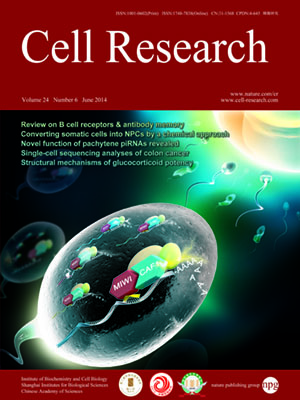
Volume 24, No 6, Jun 2014
ISSN: 1001-0602
EISSN: 1748-7838 2018
impact factor 17.848*
(Clarivate Analytics, 2019)
Volume 24 Issue 6, June 2014: 766-769 | Open Access
LETTERS TO THE EDITOR
Double-stranded DNA in exosomes: a novel biomarker in cancer detection
Basant Kumar Thakur1,2,*, Haiying Zhang1,*, Annette Becker1, Irina Matei1, Yujie Huang1, Bruno Costa-Silva1, Yan Zheng1, Ayuko Hoshino1, Helene Brazier1, Jenny Xiang3, Caitlin Williams1, Ruth Rodriguez-Barrueco4, Jose M Silva4, Weijia Zhang5, Stephen Hearn6, Olivier Elemento7, Navid Paknejad8, Katia Manova-Todorova8, Karl Welte9, Jacqueline Bromberg10, Héctor Peinado1 and David Lyden1
1Children's Cancer and Blood Foundation Laboratories, Departments of Pediatrics, Cell and Developmental Biology, Weill Cornell Medical College, New York, NY 10021, USA
2Department of Pediatric Hematology and Oncology, Hannover Medical School, Hannover 30625, Germany
3Genomic Resource Core Facility, Weill Cornell Medical College, New York, NY 10065, USA
4Department of Pathology, Icahn School of Medicine at Mount Sinai, New York, NY 10029, USA
5Bioinformatics Laboratory, Department of Medicine, Icahn School of Medicine at Mount Sinai, One Gustave L Levy Place, New York, NY 10029, USA
6Microscopy Facility, Hershey Building Room 103, Laboratory of Cancer Systems Biology, Cold Spring Harbor Laboratory, Cold Spring Harbor, NY 11724, USA
7Department of Physiology and Biophysics, Institute for Computational Biomedicine, Weill Cornell Medical College, New York, NY 10065, USA
8Molecular Cytology Core Facility, Memorial Sloan Kettering Cancer Center, New York, NY 10065, USA
9Department of Molecular Hematopoiesis, Hannover Medical School, Hannover 30625, Germany
10Department of Medicine, Memorial Sloan-Kettering Cancer Center and Weill Cornell Medical College, New York, NY 10065, USA
Correspondence:
Exosomes, small membrane vesicles (30-100 nm) of endocytic origin secreted by most cell types, contain functional biomolecules, which can be horizontally transferred to recipient cells1. Exosomes bear a specific protein and lipid composition, and carry a select set of functional mRNAs and microRNAs2. Recently, our group has shown that c-Met shed in exosomes can promote a proangiogenic and prometastatic phenotype in bone marrow-derived progenitor cells during melanoma progression3. In previous research, retrotransposon RNA transcripts, single-stranded DNA (ssDNA), mitochondrial DNA, and oncogene amplifications (i.e., c-myc) have been detected in microvesicles4,5,6. In this report, we provide evidence that tumor-derived exosomes carry double-stranded DNA (dsDNA), as demonstrated through two different approaches, using enzymatic methods (dsDNA-specific shrimp DNase) and physical/structural studies (atomic force microscopy, AFM). Furthermore, we show that exosomal DNA (exoDNA) represents the entire genome and reflects the mutational status of parental tumor cells. We also highlight the translational value of exoDNA in tumor-derived exosomes for its potential usefulness as a circulating biomarker in the early detection of cancer and metastasis.
doi:10.1038/cr.2014.44
FULL TEXT | PDF
Browse 3386


